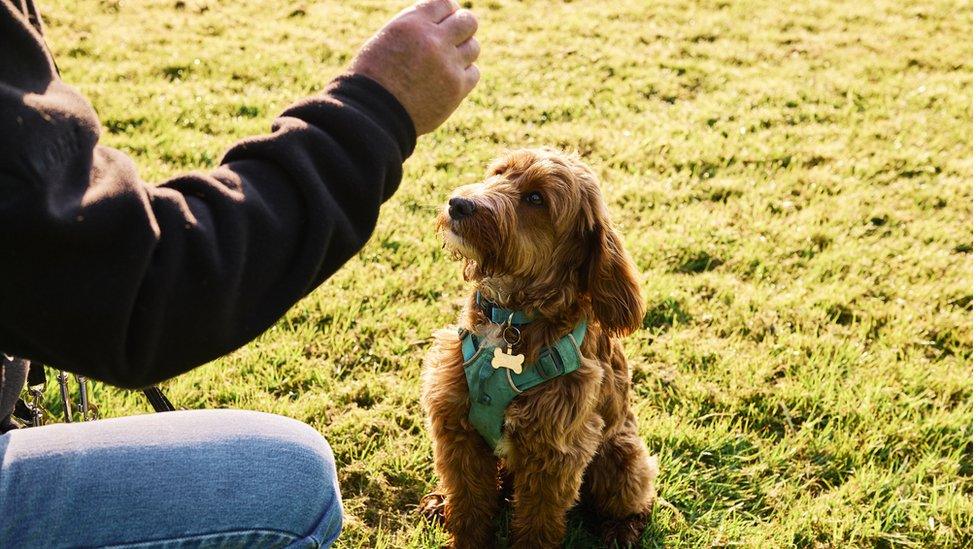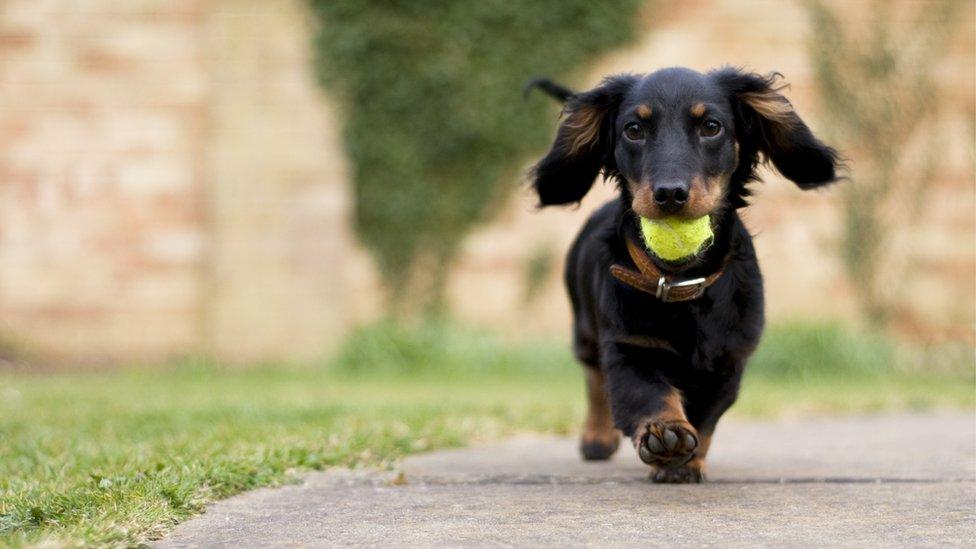Covid: Dog behaviour problems linked to lockdowns
- Published

The knock-on effects of Covid lockdowns are being seen in the behaviour of some dogs, experts have said.
The Ulster Society for the Protection of Animals (USPCA) said it had seen more animals with behavioural issues.
Statistics showed dog attacks increased in 2021-22.
The charity and a dog behaviourist told the BBC they had seen people getting dogs which were not suited to them and that dogs had not been socialised properly.
People struggling with pets have been urged to seek help.
'Dog delivery'
Pet ownership rose during the pandemic - with an extra 3.2 million households across the UK buying a pet from March 2020 to March 2021.
The cost of buying dogs soared as a result as many people took the opportunity to get a dog while they were working at home.
Dog behaviourist Sandra Gilliland said a number of factors related to the pandemic were to blame.
One, she said, was that the way people purchased or adopted puppies changed.
"A lot of it was done online or on Facebook," she said.
"A common story was the dog was "delivered" to a person or collected from a garage forecourt or outside the breeder's house.
"Also they did not get to see the dog's parents or the environment where the puppy was reared.
"They were getting these puppies without getting to interact with the parents."

Sandra Gilliland trains dogs and has assessed them and written reports for court in relation to dog legislation
She also stressed the importance of people getting dogs suitable to their situation - she has seen people in towns and cities adopting border collies for example.
She added it was important people used reputable trainers.
"A lot of people during the pandemic followed trainers on social media and often some of these methods just suppress a dog's behaviour so following these at home could be doing more damage and creating a ticking timebomb," she said.
Figures from the Department of Agriculture, Environment and Rural Affairs (Daera) showed there were 1,429 dog attacks recorded by councils in Northern Ireland in 2021-22 - an increase from 1,354 the previous year.
There were 707 attacks on people and 593 attacks on pets in that year.
There were 6,807 attacks recorded in the five years between April 2017 and March 2022.
'Most awful scream'
Colleen Tinley, USPCA chief operating officer, said puppy classes and puppy training were put on hold when lockdowns came into effect at the same time many people got pets as companions.
"We have seen a rise in animals coming into us with issues and many of those issues are caused by a lack of training and socialisation," she said.
She urged people to be responsible dog owners and encouraged anyone with issues to contact their vet or the USPCA, which could provide help and support.

Minerva was killed by three dogs
One woman who has experienced the trauma of aggressive dogs first hand is Margaret Ellis from County Down.
Her cat Minerva was killed on 24 October when she let her out into the back garden.
"About 10 minutes later I heard the most appalling crashing, growls and the most awful scream," she said.
"I went out and a neighbour was trying to chase these dogs out and he told me they had got her and trapped her and one had her in their mouth."
The dogs were chased away and Ms Ellis said four cars then arrived to collect them and take them away before police arrived.
She said she then contacted the council's dog warden but found it took a long time for anything to happen and she was ultimately frustrated by the lack of action.
She said she would like to see the government take a fresh look at the law to see if it could be adjusted to make it easier to tackle out-of-control dogs.
'Owners with little knowledge'
The attack on Minerva happened in the Armagh, Banbridge and Craigavon District Council area.
The council said it had seen a slight increase in attacks in the past two years.
"We believe this could be contributed to the increase in dog ownership during the Covid pandemic, and in particular new dog owners with little knowledge and experience of keeping a dog," a spokesperson said.
"We maintain a robust enforcement policy to deal with attack offences and apply a zero-tolerance approach to stray dogs, supported by education and advice on responsible dog ownership which is a key part of our dog warden service."
The BBC has also uncovered evidence across the UK of organised crime moving into "extreme dog breeding" at the expense of animal welfare.
A Daera spokesperson said extensive powers existed under the law which covered the control and behaviour of dogs.
"The NI Direct website sets out information and guidance on safe interactions with dogs, in recognition of the fact that any dog can be dangerous," they said.
"The public is advised that dog owners are responsible for how their dog behaves at home and in public, and they should always take steps to make sure that interactions with other dogs and people, particularly children, are safe."
Related topics
- Published12 March 2021

- Published27 January 2021

- Published26 December 2020

- Published23 January 2023
